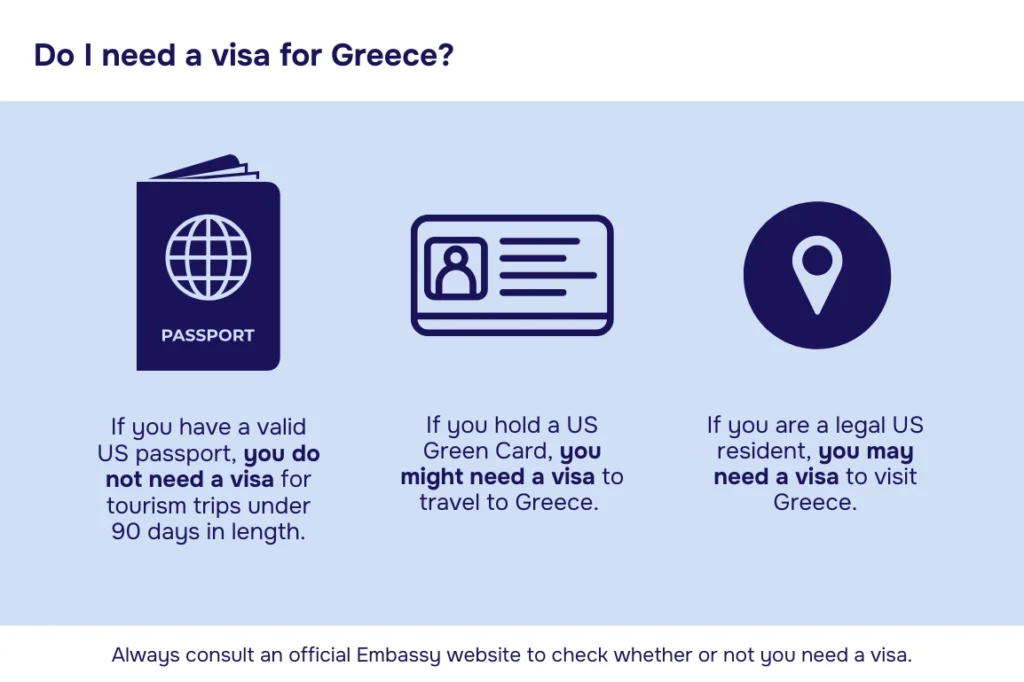Home > Applying for a Schengen Visa for Greece

Applying for a Schengen Visa for Greece
If you're planning a trip to Greece, there is a list of things you need to think about.
One, where you're going to go, of course (Athens? Mykonos? Somewhere else entirely?) Then, there are all of the sights you're going to see... beaches, ancient ruins...
But on top of all of that, there are a few more administrative things you need to consider, like the Schengen visa process and whether or not travel insurance is required.
We're here to help.

Do I need a visa to go to Greece?
It depends.
Depending on your nationality and the purpose (as well as length) of your visit, you might need a visa to visit Greece.
Some travelers are visa-exempt (citizens of the US, UK, Australia, Canada, and several other countries), meaning they do not need to apply for a visa, so long as the trip is short and primarily for travel/leisure.
On the other hand, however, many countries do not have visa waiver agreements with Greece, which means citizens of these countries (such as India or China) do need visas to visit Greece.

Do US citizens need a visa for Greece
If you’re a U.S. citizen traveling to Greece for tourism or business for less than 90 days, you don’t need a Greece visa.
However, starting in 2026, U.S. citizens will be required to apply for an ETIAS (European Travel Information and Authorization System) before visiting Greece. We’ll talk more about this later in the article.
How long can you stay in Greece without a visa?
Visa-exempt travelers, such as British or US citizens, can stay in the Schengen area for up to 90 days maximum without a visa. This is true across the entire Schengen area, Greece included.
Once 90 days have been met, you must leave the zone for the remainder of the 180-day period (90 days) before you're able to visit again.

How to apply for a Schengen visa for Greece
If you need a visa to visit Greece, the application process is relatively straightforward. However, it does require preparation, so applying early is highly recommended. There are a few steps involved:
- Figure out which visa you need, depending on your intent and length of stay.
- Collect the required documents for the specific visa you’re applying for.
- Schedule an appointment at a Greek consulate or visa center in your country of nationality.
- Attend the appointment and submit your application for processing!
Can I apply for a Schengen visa for Greece online?
No. The Greek visa cannot be fully applied for online. While you can fill out the application form online, you’ll need to book an appointment for a Greek visa at your nearest Greek consulate or visa application center (in your country of residence).
Secure Your Schengen Visa
If you're getting a Schengen visa to travel to Greece, compliant insurance is mandatory. Get it 100% online here ??
Afterward, you must attend the appointment in person to submit your documents and biometric data, as well as meet with a visa officer to review your file.
With that being said, the Schengen process is currently being digitized. Expected to be fully operational in 2030, EU VAP will facilitate Greek visa applications online. Even still, there will be an in-person requirement. Biometrics (fingerprints) will need to be taken in person at a consulate or visa center.

Is a Greek visa difficult to get?
The application process is relatively straightforward.
What is the rejection rate for Greece visas?
In 2024, 13.2% of Greek Schengen visa applications were denied. That's a tad lower than in 2023 (where 14.5% were).
Most rejections are due to incomplete documentation or not meeting the financial criteria, so double-check your paperwork before submitting your application.
It’s important to note that rejection rates can change at any time, and they also depend on a variety of factors, such as seasonality.
What is the processing time for a Greece visa?
The processing time for a Greece visa usually takes about 15 calendar days from the time you submit your application. However, processing time can take longer. This is why it’s always important to start your visa application process early to make sure you aren’t in a time crunch at the end.

Greece visa application requirements
Understanding the requirements is key to ensuring a smooth application process. Whether you’re visiting for tourism, work, or study, each visa type has specific document requirements.
Which documents are required when applying for a Greece visa?
Regardless of which type of Greek visa you apply for, there are a few essential documents that will likely be required for your application. Then, each visa type will have additional documentation required on top of that.
When applying for a Greek Schengen visa, essential documents typically include:
- A valid passport (with at least 3 months of validity beyond your stay).
- A completed visa application form.
- Two recent passport-size photos.
- A travel insurance policy that meets Schengen visa insurance requirements (with coverage of at least €30,000).
- Proof of accommodation in Greece (hotel bookings or proof of hosting).
- Financial statements proving you can support yourself during your stay.
- A flight itinerary.

Do I need to apply for ETIAS if I have a Greek visa
If you hold a valid Greece visa, you do not need to apply for ETIAS. However, if you’re from a visa-exempt country like the US or UK, you will need ETIAS approval starting in 2026 for short stays.
Who needs ETIAS to visit Greece?
Citizens from over 60 visa-exempt countries (like the US, UK, Australia, and Canada) will need to apply for ETIAS before traveling to Greece from 2026 onwards. This application process is entirely online.
Want to learn more about ETIAS for Greece? Check out our Greece ETIAS Guide.
Greek visa FAQs
Similar visa guides
Going to Spain? Do I need a visa to go to Spain
Heading to France? Getting a visa for France
Planning a trip to Italy? Learn about Italian visas
Germany on the horizon? You may need a German visa
Off to the Netherlands? Learn about Dutch visas
Are you going to Portugal? Read the Portugal visa guide
Planning a trip to Malta? Getting a visa for Malta
Off to Iceland? Check out the Iceland visa guide
Going to Hungary? Read about Hungarian visas
Trip to Austria coming up? Read our Austria visa guide
Planning to go to Switzerland? Read about Swiss visas
Trip to Luxembourg coming up? Read about Luxembourg visas
Are you going to Norway? Read the Norway visa guide
Trip to Poland? Learn all about Polish visas
Planning a trip to Croatia? Learn about Croatia visa requirements
Are you going to the Czech Republic? Read about Czech visas here
Going to Denmark? Read our Denmark visa guide
Going to Bulgaria? You might need a Bulgarian visa
Traveling to Liechtenstein? See Liechtenstein visa information
Are you traveling to Sweden? Learn about Swedish visas
Heading to Estonia? Learn about Estonian visas
Heading to Romania? Getting a visa for Romania
Trip to Finland on the horizon? You may need a Finnish visa
Planning a trip to Slovakia? You may need a Slovakian visa
Trip to Latvia? You may need a Latvian visa
Going to Lithuania? Learn about Lithuanian visas
